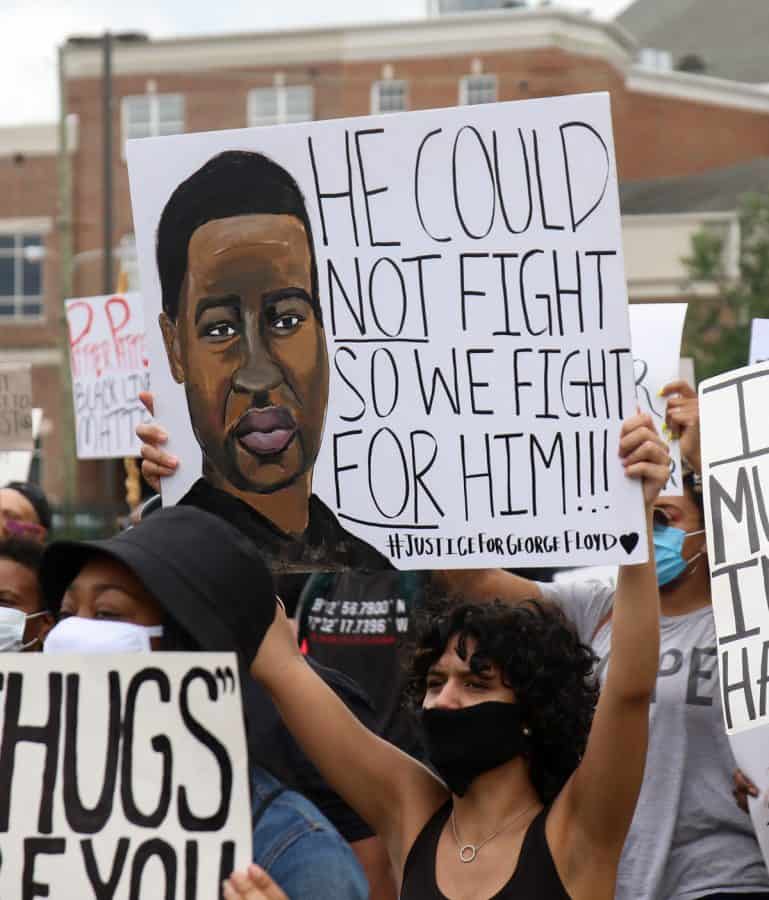Opinion | Why police brutality violates the Constitution
March 24, 2021
The eighth amendment of the U.S. Constitution reads, “Excessive bail shall not be required, nor excessive fines imposed, nor cruel and unusual punishments inflicted.” Its most frequently cited clause is certainly its last: “nor cruel and unusual punishments inflicted.”
On May 25, 2020, a man named George Floyd was suffocated to death after a knee crushed his throat for eight minutes and 15 seconds. At the time of writing, the man responsible for his death—former Minneapolis police officer Derek Chauvin—is on trial for Floyd’s murder.
That clause is commonly invoked when debating the use of the death penalty in the US. But isn’t it just as relevant to the issue of police brutality in our nation? Is squeezing the life out of a fellow human being while he cries for his mother for eight minutes and 15 seconds not cruel and unusual punishment?
Floyd tried to use a counterfeit $20 bill to buy cigarettes. Would Floyd ever have been sentenced to death for that? No. Obviously not.
He would not have faced such an exorbitant consequence even if he had been additionally charged with resisting arrest or obstruction. Indeed, Floyd would have never received the death penalty in Minnesota – the state abolished it over a century ago.
To invert the question posed by the Eighth Amendment: was Floyd’s death proper and usual? No, it certainly was not. There are many out there who have sought to defend Chauvin’s actions, but there is no defense. How could there be any defense for the actions of an officer of the law, when those actions directly violate the highest law of the land?
There was no threat to Derek Chauvin’s life. He had two other armed officers with him. Floyd had nothing to defend himself with. Just the apparently incriminating color of his skin.
Somehow, these instances of police brutality and excessive force – instances which increase in number every single year in America – always seem to be warped and manipulated into debates over minute details or irrelevant factors that distract from the glaring grotesqueness of their substance.
It is understandable that some try to rationalize these disturbing acts, because they are being performed by the people whom we are supposed to rely on for protection. But accepting these crimes as justice is deplorable, malicious and beyond reproach.
Let the monstrous issue of institutional racism leave the picture for a moment. The actions of Derek Chauvin and others like him (which we have seen forgiven time and time again) are unconstitutional. They violate the Eighth Amendment. How can we accept the legitimacy of the American legal system when it doesn’t even respect the Constitution?
Shooting Philando Castile in front of his girlfriend and her 4-year-old daughter as he reached for his license is cruel and unusual. Entering Breonna Taylor’s home unannounced and shooting her dead when her boyfriend more-than-reasonably mistakes you for armed intruders is cruel and unusual. Driving up to and then subsequently gunning down 12-year-old Tamir Rice for carrying a plastic airsoft gun is cruel and unusual.
For far too many Black men and women in America, the death penalty is a punishment that does not fall under the jurisdiction of any state government or court system. If a suspect contains enough melanin in his or her skin, a police officer gains three more badges: those of the judge, jury and executioner. They also gain exemption from Article VI of the Constitution, for it is no longer the supreme law of the land.
Should actions outside of the courtroom not be judged against our founding principles, values, and laws with the same intensity as the arguments made within those halls of justice? Why does the Bill of Rights only apply to the actions of the state building and the courtroom, and not the entirety of the nation we inhabit – every street corner, car seat, apartment complex, and public park? Why do some people in America get to administer their own twisted form of cruel and unusual justice on others and not face any justice of their own?
If real justice is to ever exist in the nation which claims to value it so greatly, it must exist for everyone, indiscriminately, at all times. But in an America where it’s controversial to claim that Black lives matter, it seems like equal and unwavering justice is a long way off.








